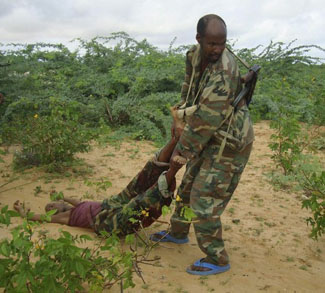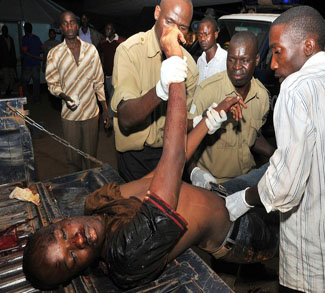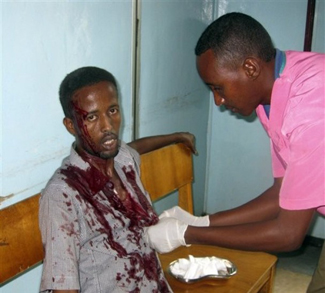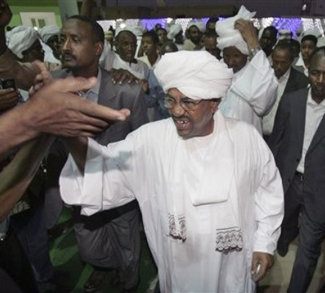The al-Shabab attack on World Cup revelers in Uganda three weeks ago has served as a wake-up call for African Union leaders.
Al-Shabab’s motivation for the Kampala attacks was likely two-fold: they allowed the group to prove its operational capacity by conducting attacks outside Somalia’s borders and they also allowed an opportunity for al-Shabab to make a grab at populist legitimacy. In other words, by justifying the attacks as revenge for indiscriminate shelling by Ugandan forces in AMISOM, al-Shabab positioned itself as defender of the Somali people against an ‘outsider’ African Union detachment in Mogadishu. This is definitely the type of imagery that al-Shabab will be using to win the hearts and minds of Somalis. Basically, the group will use nationalism to woo the masses of traditionally-moderate Somalis who wince at the more fundamentalist aspects of al-Shabab’s ideology.
However, whether or not al-Shabab can re-brand AMISOM as an ‘infidel army’ remains to be seen. The AMISOM detachment has taken over three years to get up to its intended strength of 8,000 troops, a feat which was accomplished just this week after a Ugandan pledge of 2,000 more troops. Furthermore, African Union troops have been stymied by rules of engagement that at best limit their effectiveness and at worst put them in grave danger. Essentially, the AMISOM detachment has never had the necessary resources to be effective, so the question of whether or not a reinforced AMISOM can make in-roads against al-Shabab remains a mystery.
Although the AMISOM mandate has remained largely untouched by African Union heads of state at this week’s summit in Kampala, AMISOM troops will now be able to conduct pre-emptive strikes on militants. Also, the two Muslim-majority states of Guinea and Djibouti have pledged to send troops to Somalia to bolster AMISOM numbers.
It seems that the Kampala attacks may have backfired on al-Shabab. Far from deterring African Union members from sending troops to Somalia, they seem to have revitalized the AMISOM mission. Instead of seeing the Somali conflict as strictly a domestic affair, African Union leaders are starting to view it as a regional security threat- and they are responding in kind.
Over the next few months, we will see whether an unfettered and better-supplied AMISOM can make a push against al-Shabab militancy.
Around the internet, BBC News’ Will Ross has raised the possibility that an enlarged AMISOM mission may play into al-Shabab’s plans:
However the presence of more foreign troops in Somalia and the deaths of more civilians could well play right into the hands of al-Shabab… It wants to paint the AU mission, like the earlier Ethiopian intervention, as a foreign invasion and in so doing gain more support from Somalis and possibly jihadists way beyond the country’s borders.
AllAfrica has carried an interview with Johnnie Carson, Assistant US Secretary of State, on the potential for conflict in Somalia to spread throughout the region. Here’s an excerpt on what he sees as the crux of potential regional instability:
However the presence of more foreign troops in Somalia and the deaths of more civilians could well play right into the hands of al-Shabab… It wants to paint the AU mission, like the earlier Ethiopian intervention, as a foreign invasion and in so doing gain more support from Somalis and possibly jihadists way beyond the country’s borders.
AllAfrica has carried an interview with Johnnie Carson, Assistant US Secretary of State, on the potential for conflict in Somalia to spread throughout the region. Here’s an excerpt on what he sees as the crux of potential regional instability:
Beyond piracy, we see a multiplicity of problems flowing throughout the region. Violent extremism is an issue of international concern. The bombings in Kampala are a result of violent extremism. We know some of the leaders of the al-Qaeda east African cell were responsible for the tragic bombings of the American embassies in Dar-es-Salaam and Nairobi on August 7th, 1998, and were responsible for the Paradise Hotel bomb blast in November 2002 and the attempt to shoot down an Israeli commercial plane on the same day. It is no longer possible for the international community to ignore the danger from a continued absence of security and governance in south-central Somalia.




